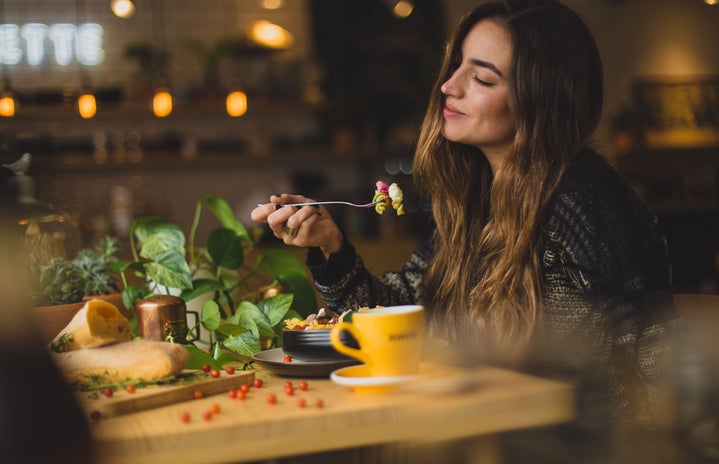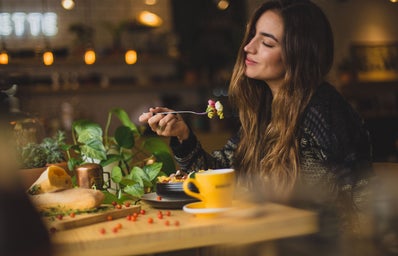Content warning: Discussion of eating disorders and dieting
Over the past year or so, I have been on an interesting journey with body positivity. The more I’ve made peace with my relationship with food, the more I have learned about the culture of body positivity and its growing influence on social media. As I started accepting my body, I integrated myself into this culture, picking up on ideas and lingo that I had never heard before.
Specifically, I have learned more about the pervasive “diet culture” in our society.
Breaking down diet culture
Before I found the body positivity community, I didn’t even know what diet culture was. I had no clue how it was affecting my self-image or my relationship with food. However, I now understand the devastating effect it has had on me and countless other people.
According to Christy Harrison, diet culture is the part of culture that “worships thinness and equates it to health and moral virtue.” Diet culture in the way we demonize brownies as “guilty pleasures” and glorify eating salads for lunch. It’s the way people equate being thin to being happy, and use weight as a marker of health. It’s something that is so deeply ingrained in society that a lot of people don’t even know it’s there. The problem is how damaging it can be for us, even during the most trying times.
If you don’t quite buy that we are surrounded by diet culture, look at the ways we as a society have handled a literal worldwide pandemic. Our lives got turned upside down and it felt like the world fell apart. Many of us left our friends, some of us lost our jobs, and all of us found ourselves battling the anxiety of the unknown. And yet, what so many of us were told to worry about was not the economy, or the people who were dying, but rather whether or not we gained weight during a global pandemic.
The COVID-15
“Gaining the COVID-15” was something we were told to fear, as if the scariest thing that could happen to us during a pandemic was that our bodies would change. So, many of us hopped on the newest diet train, doing two week challenge programs and cutting carbs in order to avoid gaining the “COVID-15.” Diet and exercise trends to lose that weight we’ve gained are now popping up as ads everywhere, continuing off the destructive narrative that the worst thing we could do was gain weight.
All this stress eating has me well on my way to gaining the COVID-19.
— ? Heather Spohr ? (@mamaspohr) March 18, 2020
We are told that our bodies are the problem. We are told that even during the most transitional portions of our lives, during the moments where we need to be the kindest to ourselves, to become smaller. Why is it that so many people wanted to use quarantine to get “snatched,” but not many made it their goal to make peace with food?
Saying things like “don’t gain the COVID-15” tells people that their body and its natural fluctuations are inherently bad, as if your body doesn’t know how to take care of itself. These phrases tell us our bodies are something that need to be controlled, and need to be fixed.
Let me make this clear: your body is NOT something that needs to change. It is not something that needs to be fixed. Your relationship with your body, and how you view food — that’s what you should work on.
Quarantine and body positivity
It’s easy for me to write this in retrospect, but if I’m honest, quarantine has been hard on my body positivity. There were times I looked in the mirror, wanted to hop on the scale and wanted to throw out every bit of chocolate in my pantry. I found myself starting to worry about gaining too much weight during quarantine. I was scared to try on the pants I hadn’t tried on in months. I’m not here to tell you that I didn’t find myself avoiding the “COVID-15,” as that phrase was repeated in commercials and on social media over and over. There were moments I wanted to hop on the latest quarantine diet, come out for the next school year with a perfect body, and times I found myself fighting my body.
And I know I’m not alone in this.
I was able to turn this energy around, and instead focus on fixing my relationship with food. I let my body tell me what it needed, and I stopped fighting it. I used quarantine to fix my relationship with food, and I have never been prouder of myself for anything. I have never found more peace in my own body, and I can only hope that others can do the same.
Improving your relationship with food & body
So what does i t look like to fix your relationship with food? Obviously, I don’t know everyone’s unique struggle, but I can tell you what fixing my relationship with food looked like for me. The first thing, and the most important thing, that I did was unfollow every single Instagram account that either referenced diet culture or made me feel bad about my body. I unfollowed popular models, diet accounts, and instead followed accounts that promoted self-love and guilt-free eating.
Another really important thing I did to improve my relationship with food was follow an intuitive eating type approach to what I was eating. I let myself eat when I was hungry. That sounds really basic, but it is something that a lot of people neglect. Our body is GREAT at telling us what it needs. Are you hungry? Eat. Do you want a bagel for breakfast? Eat a bagel. Doing this helped me realize that my body is my best dietician. I took labels off good and bad foods, and gave myself unconditional permission to eat what I wanted. It is no longer a question of whether I should eat an apple or a brownie, it is a question of what my body wants. Taking these labels off food made it so I no longer felt intense emotions before or after eating foods that I had previously avoided.
Food is not your enemy. The fact that I even have to say that is absurd, but it needs to be said. You have to stop fighting your body in order to fix your relationship with food. For the same reason that you drink when you’re thirsty, you need to eat when you’re hungry. When you stop doing your best to suppress your hunger cues and instead “honor your hunger”, you would be surprised at how eating no longer is associated with hunger
Read: What Happened When I Tried Intuitive Eating for a Week
I know fixing your relationship with food is not easy, but recognizing the diet-culture we live in can be the first step. We live in a world that is constantly telling us to be fearful of gaining weight. We tell freshmen in college to avoid the “Freshman 15,” and apparently we also tell people during a global crisis that has changed all of our lives drastically to avoid the “COVID-15.” Diet culture is real. Diet culture is pervasive. All we can do as members of society is to identify how much diet culture has affected our vocabulary, and do our best to cut those terms out.


